Most Americans find it acceptable for an unmarried couple to live together, even if they don’t plan to get married. A majority also says that married and cohabiting couples can raise children equally well. At the same time, the public still sees societal benefits in marriage, and many say marriage is important, though not necessarily essential, in order for a man or a woman to live a fulfilling life.
Views of marriage and cohabitation vary by age, with younger adults more likely to find cohabitation acceptable and to see it as having a positive impact on a couple’s chances for a successful marriage. Opinions also differ by race and ethnicity, religious affiliation and party.
About two-thirds of adults favor allowing unmarried couples to enter into legal agreements that would give them the same rights as married couples, a view that is particularly common among Democrats and those who lean Democratic. To the extent that the public sees advantages for those who are married versus cohabiting, they say married people generally have it easier when it comes to achieving certain goals.
Most Americans say cohabitation is acceptable even without marriage plans
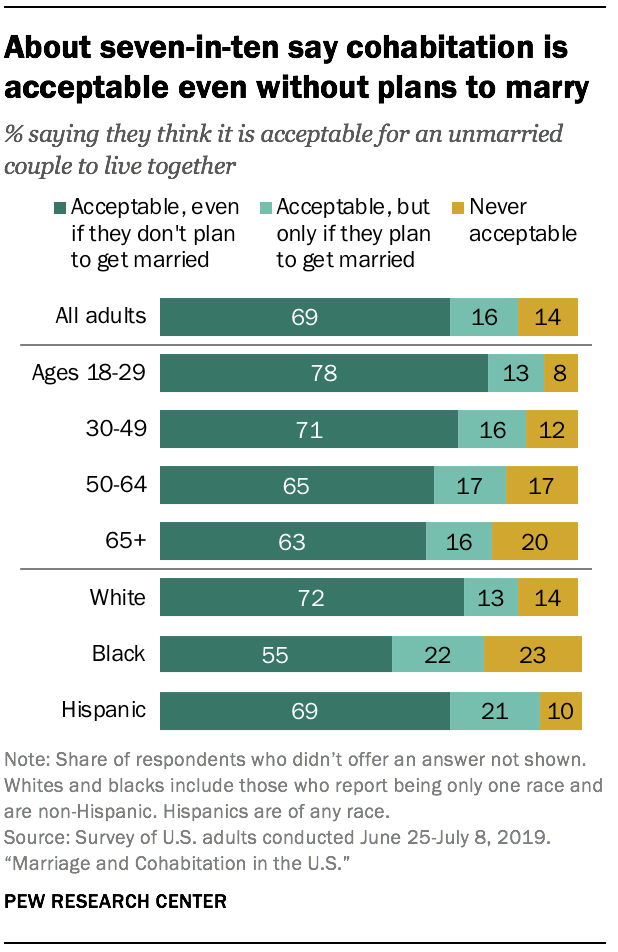
The vast majority of Americans think it’s acceptable for an unmarried couple to live together. Most Americans (69%) say cohabitation is acceptable even if the couple doesn’t plan to get married, while another 16% say it’s acceptable, but only if the couple plans to marry; 14% say this is never acceptable.
Younger adults are more likely than their older counterparts to find it acceptable for an unmarried couple to live together. About eight-in-ten adults younger than age 30 (78%) say that cohabitation is acceptable even if the couple doesn’t plan to marry, compared with 71% of those ages 30 to 49, 65% of those 50 to 64, and 63% of those 65 and older.
Views on cohabitation differ widely by race and ethnicity. Overall, black adults (55%) are less likely than white (72%) and Hispanic (69%) adults to say that cohabitation is acceptable without marriage plans.
Opinions also vary significantly by religious affiliation. Among adults who are religiously unaffiliated, 90% say it’s acceptable for an unmarried couple to live together even if they don’t plan to get married. Roughly three-quarters of Catholics (74%) and white Protestants who do not self-identify as born-again or evangelical (76%) say the same. Smaller shares of black Protestants (47%) and white evangelical Protestants (35%) share this view.
There are partisan differences in these views as well. About eight-in-ten Democrats and those who lean Democratic (79%) say cohabitation is acceptable without marriage plans, compared with 58% of Republicans and Republican leaners.
Among Republicans, those ages 18 to 29 stand out in their opinions on this issue. About seven-in-ten Republicans younger than 30 (71%) say that cohabitation is acceptable even if the couple doesn’t plan to marry, compared with 58% of those ages 30 to 49, 57% of those 50 to 64, and 50% of those 65 and older. In contrast, Democrats’ views are more uniform across age groups.
Not surprisingly, views on this issue are linked to personal experiences. The overwhelming majority of adults who are currently living with a partner (89%) say cohabitation is acceptable without marriage plans. By comparison, about two-thirds of those who are married (64%) express this view; married adults who lived with their spouse before getting married are much more likely than those who didn’t live together to say this (77% vs. 46%).
Many see societal benefits in marriage
Although cohabitation is widely viewed as acceptable, the public still sees societal benefits in marriage. A slight majority of Americans (53%) say that society is better off if couples who want to stay together long-term eventually get married, while 46% say society is just as well off if they decide not to marry.
Again, views vary considerably by age, race and ethnicity, religious affiliation and party. Overall, adults ages 65 and older (64%) are more likely than those ages 50 to 64 (55%), 30 to 49 (48%) and 18 to 29 (45%) to say society is better off if couples who want to stay together long-term eventually get married. This pattern by age is evident among both Democrats and Republicans.
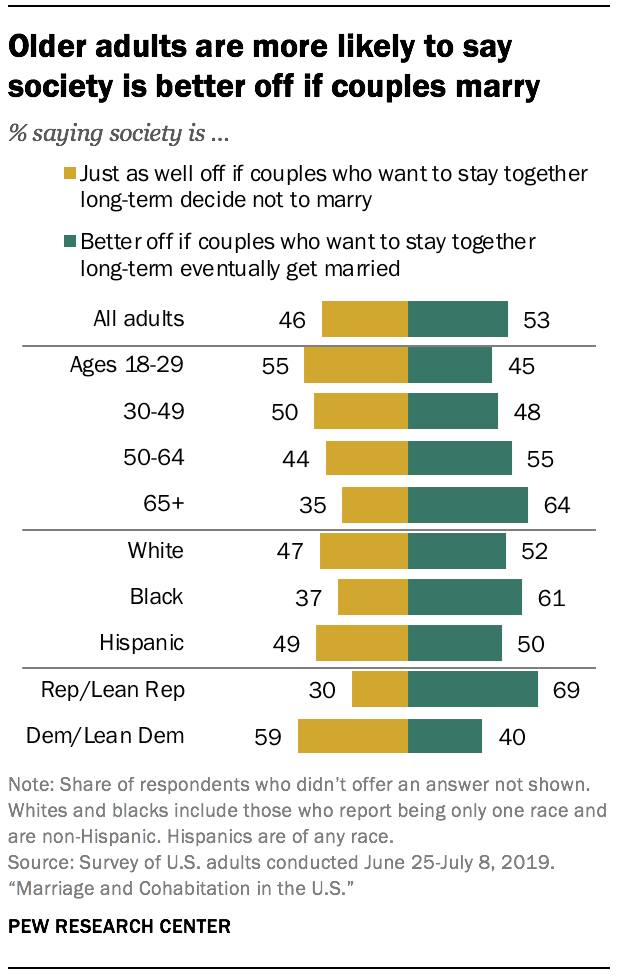
About six-in-ten black adults (61%) say society is better off if couples who plan to stay together get married in the long run; roughly half of white (52%) and Hispanic (50%) adults say the same.
White evangelicals are among the most likely to say society is better off if couples get married: 78% say this, compared with 69% of black Protestants, 57% of Catholics and 52% of white non-evangelical Protestants. By contrast, among adults who are religiously unaffiliated, just 31% express this view.
Most Republicans (69%) say that society is better off if couples who want to stay together in the long run get married at some point, while a majority of Democrats (59%) say society is just as well off if these couples don’t get married.
These views also vary by marital status and personal experiences with cohabitation. Married adults are far more likely than those who are cohabiting to say society is better off if couples get married (63% vs. 35%).
Majority says cohabiting and married couples can raise children equally well
While many Americans see societal benefits in marriage generally, when asked specifically about raising children, a majority (59%) says that couples who are living together but not married can raise children just as well as married couples. Four-in-ten say married couples do a better job of raising children than couples living together but not married.
Views diverge sharply by age here too. Two-thirds of adults younger than 50 say cohabiting couples can raise children just as well as married couples, compared with 55% of those ages 50 to 64 and 44% of those 65 and older.
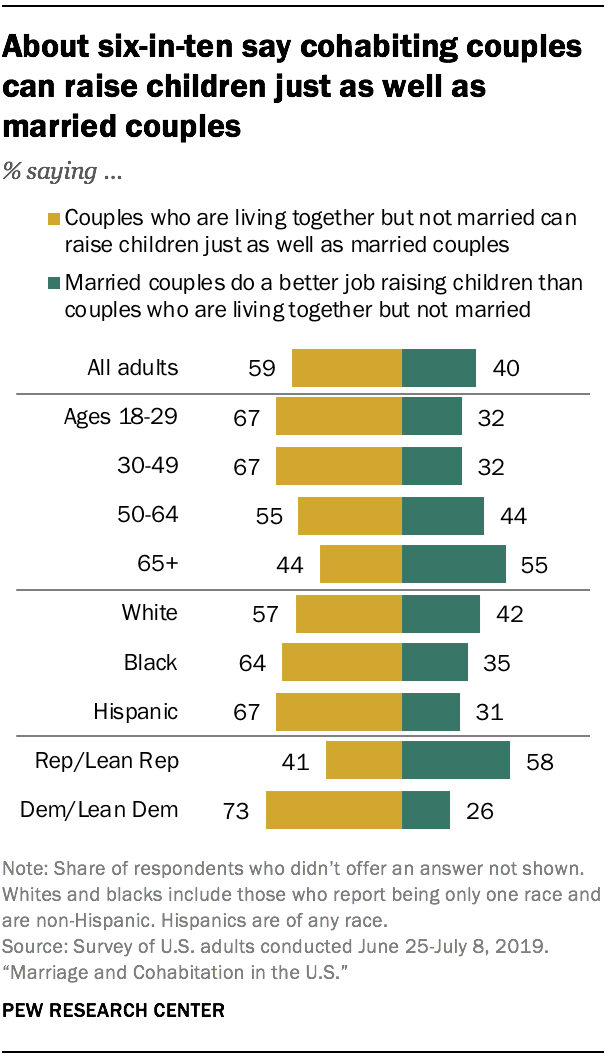
Partisan divides are evident on this question as well. Most Democrats believe that cohabiting couples can raise children just as well as married couples can (73% say this). By contrast, a majority of Republicans take the opposite view: 58% say married couples do a better job.
Overall, black (64%) and Hispanic (67%) adults are more likely than white adults (57%) to say cohabiting couples can raise children just as well as those who are married.
Roughly six-in-ten white non-evangelical Protestants (57%) and black Protestants (59%) say cohabiting couples can raise children just as well as married couples, compared with 33% of white evangelicals. Hispanic Catholics are far more likely than white Catholics to say this (73% vs. 48%). About eight-in-ten religiously unaffiliated adults (78%) share this opinion.
Education is also associated with views on this issue. Adults with a bachelor’s degree or more education (54%) are less likely than those with some college or no college experience (61% each) to see cohabiting and married couples as equally capable when it comes to raising children.
About eight-in-ten adults who are currently living with a partner (82%) say cohabiting couples can raise children just as well as married couples. By comparison, 52% of married adults share this view, but married adults who lived with their spouse before getting married are far more likely than those who didn’t live together to say this (65% vs. 34%).
Most Americans say they favor allowing unmarried couples to have the same legal rights as married couples
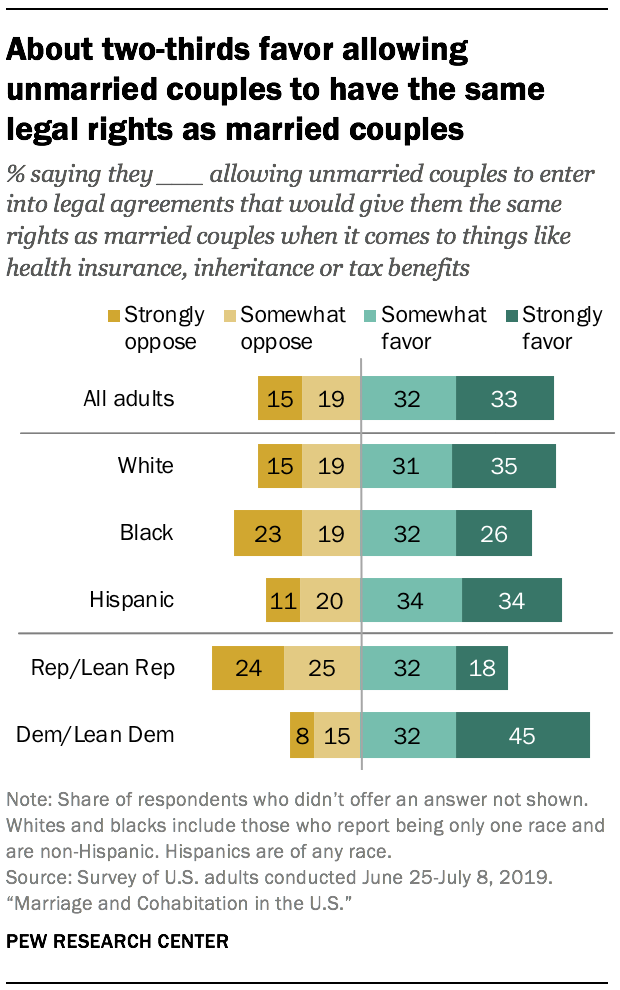
Roughly two-thirds of adults (65%) favor allowing unmarried couples to enter into legal agreements that would give them the same rights as married couples when it comes to things like health insurance, inheritance or tax benefits (33% strongly favor this).
There are relatively few differences across key demographic groups on this question, but black adults express less support for giving unmarried couples the option to have the same legal rights as married couples: 58% say they favor this, compared with 66% of white and 68% of Hispanic adults.
Democrats are far more likely than Republicans to favor allowing these types of legal agreements for unmarried couples. Roughly three-quarters of Democrats (77%) favor this, including 45% who strongly favor it. By contrast, Republicans are about evenly split: 50% favor and 49% oppose this.
Views on allowing these legal agreements are closely related to whether and under what circumstances people consider cohabitation acceptable. Among those who say it’s acceptable for an unmarried couple to live together even if they don’t plan to get married, 77% favor allowing legal agreements to give unmarried couples the same rights as married couples. Much smaller shares of those who view cohabitation as never acceptable or acceptable only if the couple plans to marry say they favor allowing these legal agreements (20% and 42%, respectively).
Plurality of adults say couples who live together before marriage have a better chance of a successful marriage
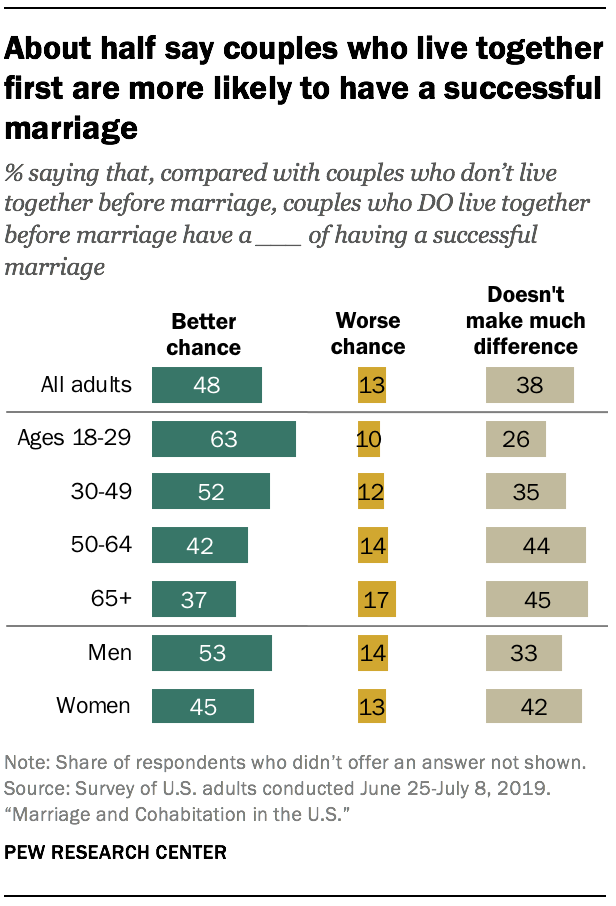
When it comes to the impact that living together might have on the success of a couple’s marriage, public opinion is more positive than negative. Roughly half of Americans (48%) say that, compared with couples who don’t live together before marriage, couples who do live together first have a better chance of having a successful marriage; 13% say they have a worse chance and 38% say it doesn’t make much difference.
Views on this question are strongly linked to age: 63% of adults younger than 30 say couples who live together before marriage have a better chance at a successful marriage, compared with 52% of those ages 30 to 49, 42% of those ages 50 to 64 and 37% of those 65 and older.
For the most part, opinions on this don’t vary much by race and ethnicity or education, but there are some differences by gender. Men are more likely than women to say couples have a better chance of a successful marriage if they live together first (53% vs. 45%). Alternatively, larger shares of women (42%) than men (33%) say it doesn’t make a difference.
Views also vary by partisanship. Democrats are more likely than Republicans to say couples who live together before marriage have a better chance of a successful marriage (57% vs. 40%), while Republicans are more likely to say they have a worse chance (21% vs. 7%).
Again, personal experiences are connected to thinking on this issue. Married adults who lived with their spouse before getting married are far more likely than those who didn’t to see living together first as increasing a couple’s chances for marital success (57% vs. 24%). Conversely, married adults who didn’t live with their spouse before getting married are among the most pessimistic about how premarital cohabitation might impact a marriage: 32% say this worsens a couple’s chance of having a successful marriage.
Majorities see committed relationships, marriage as important, but not essential, for living a fulfilling life
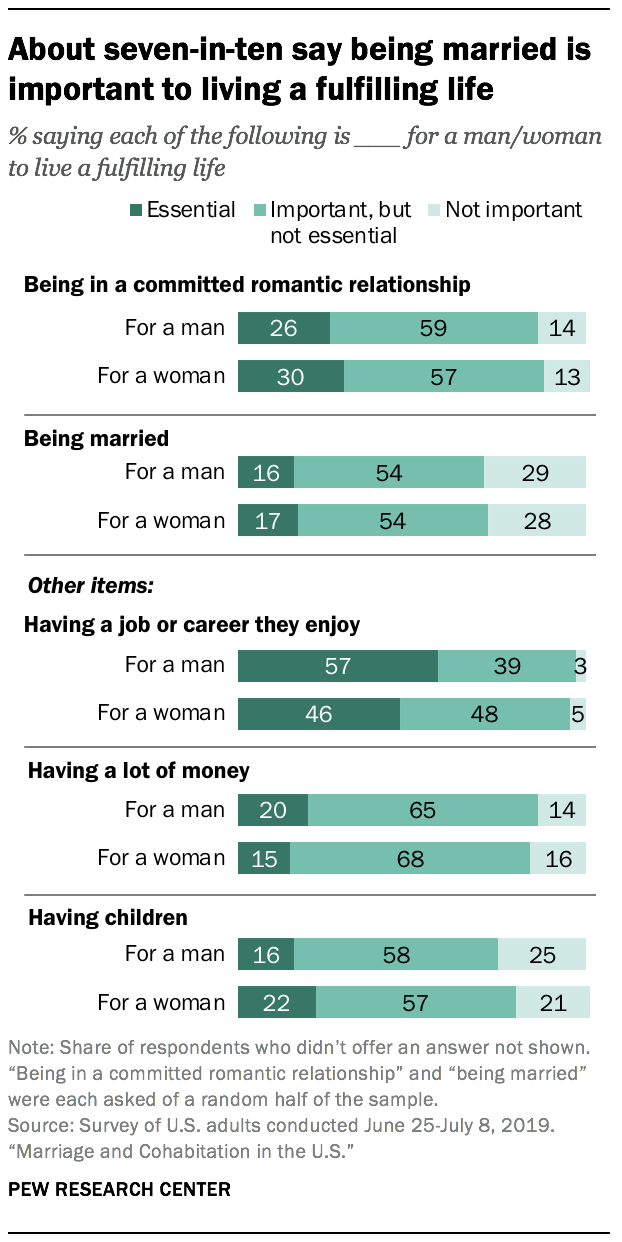
About seven-in-ten Americans say that, for a man or a woman to live a fulfilling life, being married is either essential or is important but not essential. This includes 16% who say this is essential for a man and 17% who say it’s essential for a woman; 54% say being married is important, but not essential, for men and women.
When asked more generally about being in a committed romantic relationship, larger shares see this as important in order to live a fulfilling life. Fully 85% say this is important for a man, including 26% who say it is essential; 87% say it is important for a woman, including 30% who say it is essential.8
The survey also asked about how important it is for a man or a woman to have children, a job or career they enjoy and a lot of money in order to live a fulfilling life. Of the items included, having a job or career they enjoy tops the list – nearly all Americans say this is important for personal fulfillment for a man or a woman.
While a 57% majority says having a job or career they enjoy is essential for a man to live a fulfilling life, fewer than half (46%) say it is essential for a woman. For the other items, differences in how essential these things are seen for a man versus a woman are less pronounced.
When it comes to the importance of marriage, younger adults are more likely than their older counterparts to say that being married is not important for a man or a woman to live a fulfilling life. For example, 37% of adults younger than 30 say being married is not important for a man, compared with 30% of those ages 30 to 49, 27% of those 50 to 64 and 20% of those 65 and older.
In addition, there is a gender difference in views on how important being married is for a woman. Women are more likely than men to say being married is not important for a woman to live a fulfilling life (31% vs. 24%).
Married and cohabiting adults differ substantially in their opinions on this question. About four-in-ten adults who are living with a partner say being married is not important for a man or a woman to live a fulfilling life; 20% of married adults say the same.
In a separate survey conducted this year, 43% of Americans agreed that the institution of marriage is becoming obsolete, virtually unchanged from when Pew Research Center last asked this question in 2010.9
Public sees some personal advantages in marriage over cohabitation
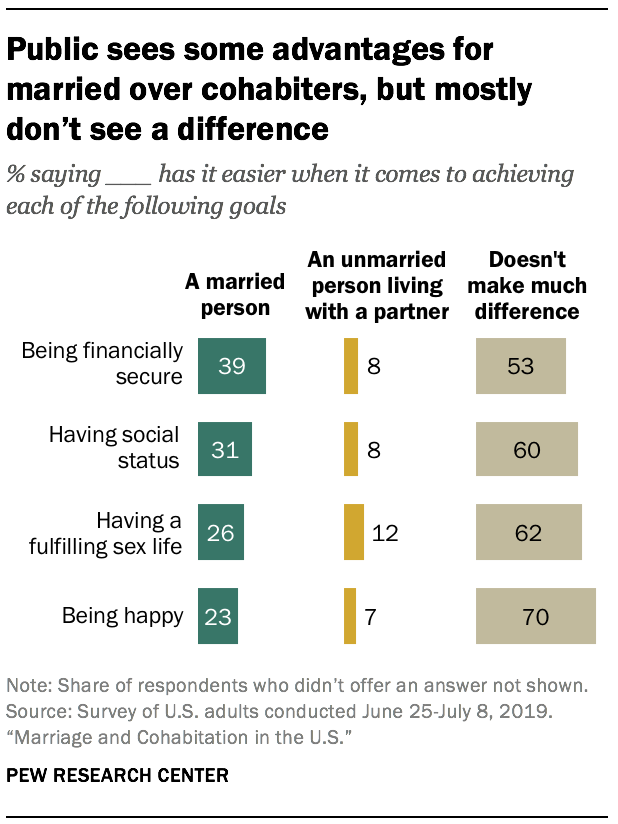
When asked whether married or cohabiting people have it easier when it comes to achieving certain goals, Americans generally don’t see much difference. To the extent that people see a difference, married people are seen as having the advantage. About four-in-ten Americans (39%) say a married person has it easier when it comes to being financially secure, and 31% say the same about having social status. Roughly a quarter say a married person has it easier when it comes to having a fulfilling sex life (26%) and being happy (23%). About one-in-ten or fewer say an unmarried person living with a partner has it easier than a married person in these areas.
On each of the four items included in the survey, married adults are more likely than those who are cohabiting to see advantages for a married person. For example, 30% of married adults say a married person has it easier when it comes to being happy; 4% say cohabiters have it easier in this regard. Conversely, among cohabiting adults, just 8% say a married person has the advantage, while 12% say a cohabiting person has it easier.
In addition, men are more likely than women to say a married person has it easier across each of these areas. Adults ages 65 and older tend to see more advantage for married people as well, compared with their younger counterparts.
Even among those who say society is just as well off if couples who want to stay together long-term decide not to marry, marriage is seen as having certain advantages, with 31% saying a married person has it easier when it comes to being financially secure and 25% saying they have an edge in terms of having social status; about one-in-ten say cohabiters have it easier in these areas (10% and 11%, respectively).




